If you’re a Head of Support who’s ever encountered agent burnout and expensive CRM implementations that took longer than expected, you’re not alone.
While not a silver bullet, getting the right contact center CRM in place can make a difference to your team's performance and culture, and spell the difference between worsening FCR rates and improving your customer experience with every interaction at your contact center.
If you’re one of the many support leaders that’s tried to implement Genesys and run into headaches around implementation and cost, this article is for you. We are going to outline the 10 best Genesys alternatives specifically for those looking to tackle agent performance challenges and improve support KPIs. If you are searching for an alternative to Genesys, you'll find options here that address common pain points and offer comparable or improved capabilities.
Introduction to Alternatives to Genesys
For many small and medium businesses, Genesys has long been recognized as a robust contact center platform with a comprehensive suite of tools for managing customer interactions across multiple channels.
But the platform’s steep learning curve, high costs, and complex setup can be overwhelming. Especially for teams with limited resources or those seeking a more agile approach. An increasing number of companies are seeking alternatives to Genesys that offer a more user-friendly experience, streamlined implementation, and cost-effective pricing.
In this article, we’ll explore the key features that set these alternatives apart, the benefits they bring to support teams, and what to consider when choosing the right contact center solution for your business needs.
What is Genesys?
Genesys is an enterprise-grade contact center platform that provides omnichannel customer engagement solutions, including voice, chat, email, and social media management. It’s designed to handle complex routing, workforce management, and customer journey orchestration across large organizations. Genesys has widely been recognized as a powerful contact center solution, offering robust features for businesses with demanding requirements.
Pros:
Comprehensive enterprise features
Robust omnichannel capabilities
Advanced routing and workflow automation
Strong integration ecosystem
Cons:
High implementation costs (often $100K+ for mid-size teams)
Steep learning curve requiring specialized training
Complex configuration that can take months
Resource-intensive infrastructure requirements
Limited real-time agent coaching capabilities
Some support teams struggle with the high cost and implementation requirements of Genesys. If this is you, keep reading to see a selection of alternative platforms below. Many Genesys competitors offer a more streamlined cloud solution for managing customer service operations, reducing infrastructure overhead and supporting remote workforces.
Key Features of Genesys Alternatives
When evaluating alternatives to Genesys, it’s important to have a sense of the key features to look out for that will drive operational efficiency and customer satisfaction for your support team. Here are a few to keep in mind:
Omnichannel support. Leading contact center solutions now offer omnichannel support, allowing you to manage customer interactions seamlessly across multiple channels (like voice, email, chat, and social media) from a unified interface.
Seamless CRM integration. This is another must-have, making sure agents have instant access to customer data and history for more personalized support.
Advanced analytics and AI-powered insights. Look for these capabilities to help you monitor performance, identify trends, and make data-driven decisions.
In addition to these, look for features like intelligent call routing, call recording, and transcription to help further streamline workflows and enhance the overall customer experience.
10 Best Alternatives to Genesys for Support Teams
Below are 10 powerful Genesys alternative platforms for support teams to consider. These platforms are designed as a complete solution for support teams, offering comprehensive tools to manage customer interactions efficiently.
These alternatives provide cost-effective solutions for business communication by supporting multiple communication channels such as calls, email, chat, WhatsApp, and social media. They often come with an extensive feature set to meet diverse operational needs.
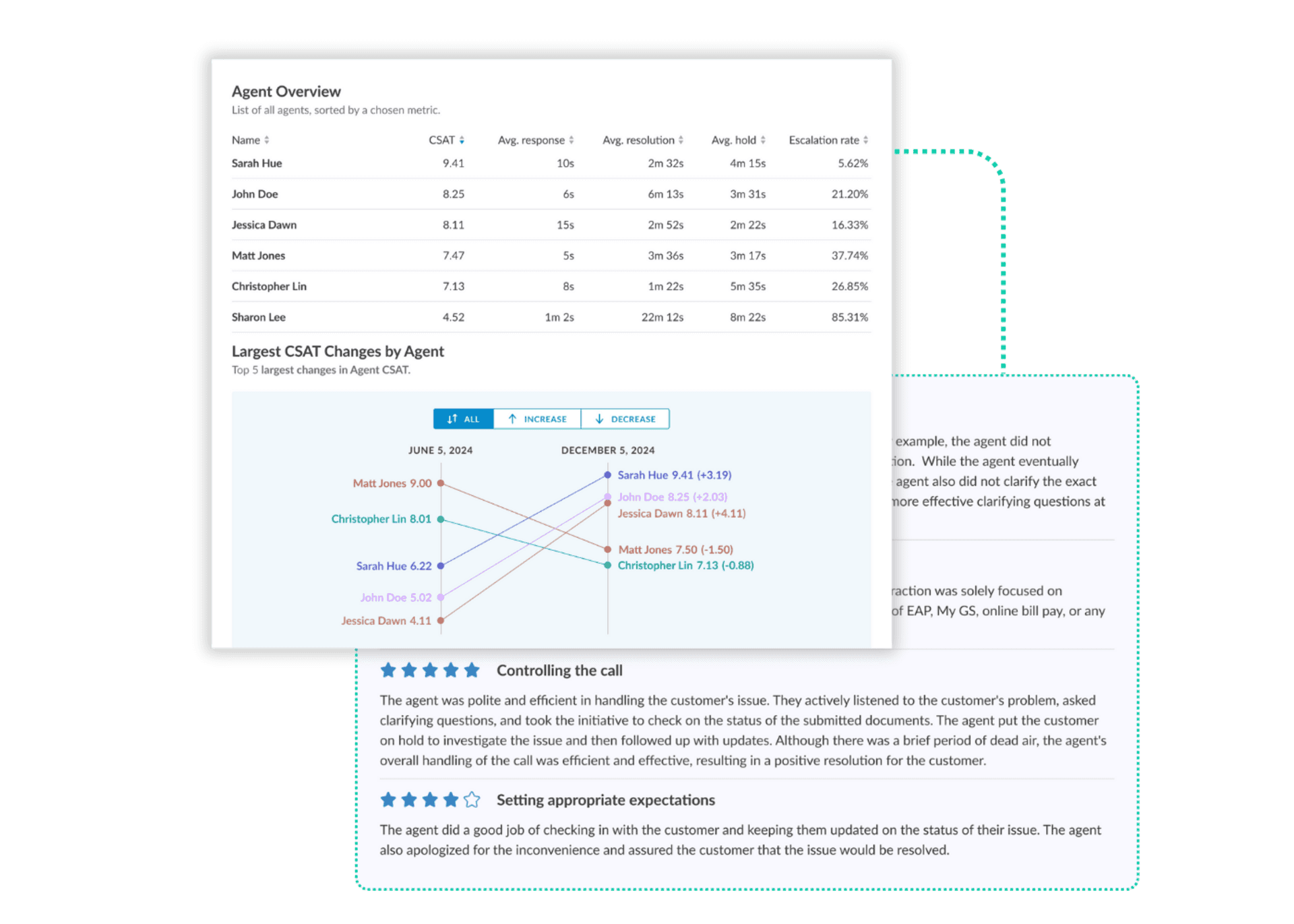
1. Kapiche
Kapiche transforms every support conversation into actionable intelligence through AI-powered analytics that give you 100% visibility into agent performance and customer sentiment. Unlike traditional support platforms that focus on call routing, Kapiche’s strength is in analyzing the content of every interaction to provide real-time coaching opportunities and predictive insights.
Key Features:
AI-powered agent coaching with specific feedback on every call
Predictive CSAT scoring without waiting for surveys
Automated quality assurance covering 100% of interactions
Real-time theme detection and sentiment analysis
Cross-channel conversation analytics (calls, chat, email)
AI-driven automation for streamlining analytics workflows and enhancing agent performance with minimal manual intervention
Best for: Support teams of 50-500 agents who want to reduce turnover, improve agent performance, and demonstrate ROI from customer experience initiatives. Perfect if you’re tired of reactive coaching based on random call samples.
Strengths:
Revolutionary coaching approach: Instead of reviewing 1-5% of calls manually, get AI-powered feedback on every interaction
Proven ROI: Customers report 40% reduction in agent turnover and 25% improvement in resolution rates
Strategic insights: Turn support data into detailed reports and leverage advanced AI features that provide executive-level insights to prove CX impact on revenue
Challenges:
Focus on analytics requires thoughtful integration with existing systems
This is perfect if you’re a Head of Support who needs to prove the business value of your team while actually improving agent performance and retention.
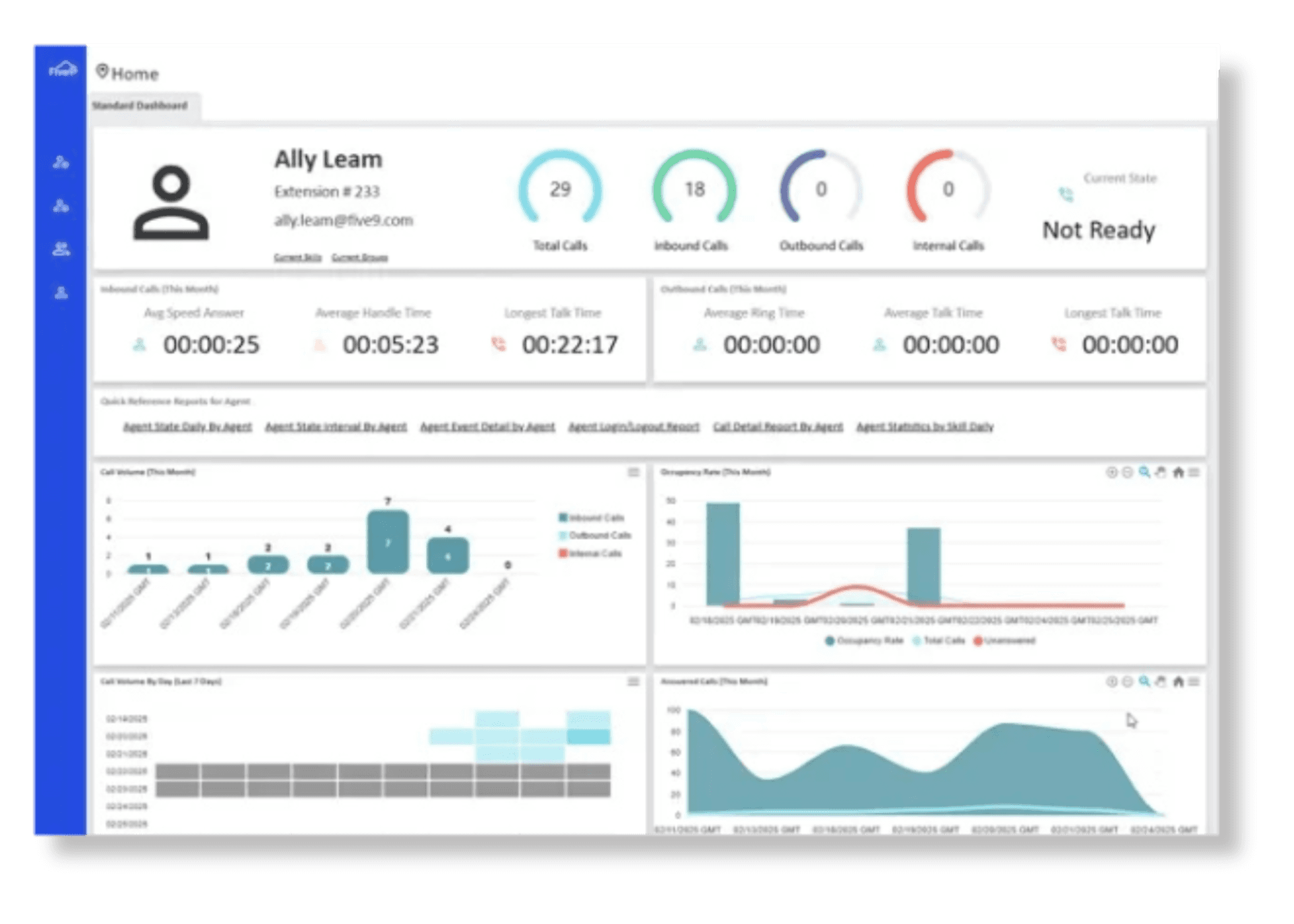
2. Five9
Five9 offers a cloud contact center platform with strong automation capabilities and workforce management tools designed for mid-market and enterprise support teams.
Key Features:
Cloud-native architecture with 99.99% uptime
Advanced call routing and IVR capabilities
Workforce management and scheduling tools
Real-time and historical reporting
CRM integrations with Salesforce, Microsoft, and others
Advanced recording features, including smart call recording and secure archives
Best for: Support teams with 100+ agents who need reliable call routing and workforce management without the complexity of Genesys, especially those that need to manage large volumes of customer interactions.
Strengths:
Reliability: Strong uptime record and disaster recovery
Scalability: Easily add or remove agents based on demand
Integration ecosystem: Pre-built connectors for popular business tools
Professional services: Offers consulting, implementation, and training support for smooth deployment
Challenges:
Limited advanced analytics for agent coaching
It can become expensive as you add features
Set up complexity for advanced routing rules
This is perfect if you’re managing a large support team and need bulletproof reliability with straightforward workforce management.
For customized pricing or tailored solutions, contact the Five9 sales team.
3. RingCentral Contact Center
RingCentral provides an integrated cloud solution that combines contact center capabilities with unified communications, making it attractive for businesses wanting a single vendor solution.
Key Features:
Unified communications and contact center in one platform
Omnichannel routing across phone calls and digital channels such as voice, chat, email, and social
Built-in video conferencing and team messaging
AI-powered conversation intelligence
Open APIs for custom integrations
Best for: Small to medium businesses (25-200 agents) who want to consolidate communication tools and reduce vendor complexity.
Strengths:
All-in-one approach: Reduces tool sprawl and training complexity
Quick deployment: Faster implementation than enterprise platforms
User-friendly interface: Intuitive design that reduces agent training time
Challenges:
Advanced contact center features lag behind specialized platforms
Limited customization for complex routing scenarios
AI capabilities are basic compared to specialized analytics platforms
This is perfect if you’re supporting a growing business and want to eliminate the headache of managing multiple communication vendors.
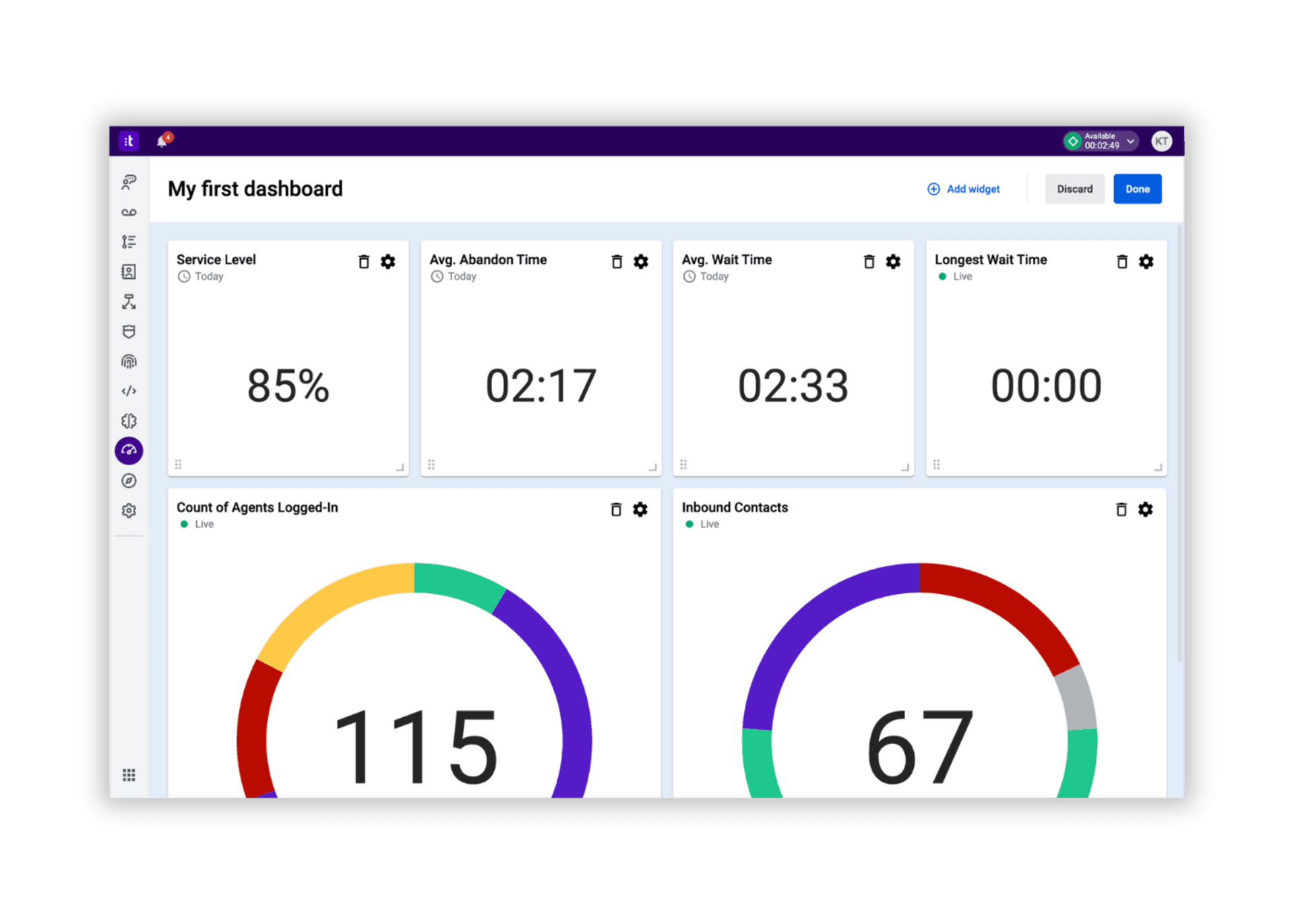
4. Talkdesk
Talkdesk focuses on providing enterprise-grade contact center capabilities with a strong emphasis on AI and automation to improve operational efficiency.
Key Features:
AI-powered automation, an intelligent virtual agent, and AI voicemail transcription as part of robust AI features
Advanced analytics and real-time dashboards
Flexible omnichannel routing
Integration marketplace with 50+ pre-built connectors
Compliance tools for regulated industries
Best for: Enterprise support teams (200+ agents) in regulated industries who need sophisticated automation and compliance features.
Strengths:
AI features: Advanced AI features for automation and customer support, including intelligent virtual agents and AI voicemail transcription
Compliance features: Strong security and compliance capabilities for healthcare, finance
Marketplace: Extensive third-party integrations
Challenges:
Premium pricing for advanced features
Can be over-engineered for simpler support operations
Limited agent coaching capabilities compared to specialized platforms
This is perfect if you’re running a large support operation in a regulated industry and need enterprise-grade automation and compliance.
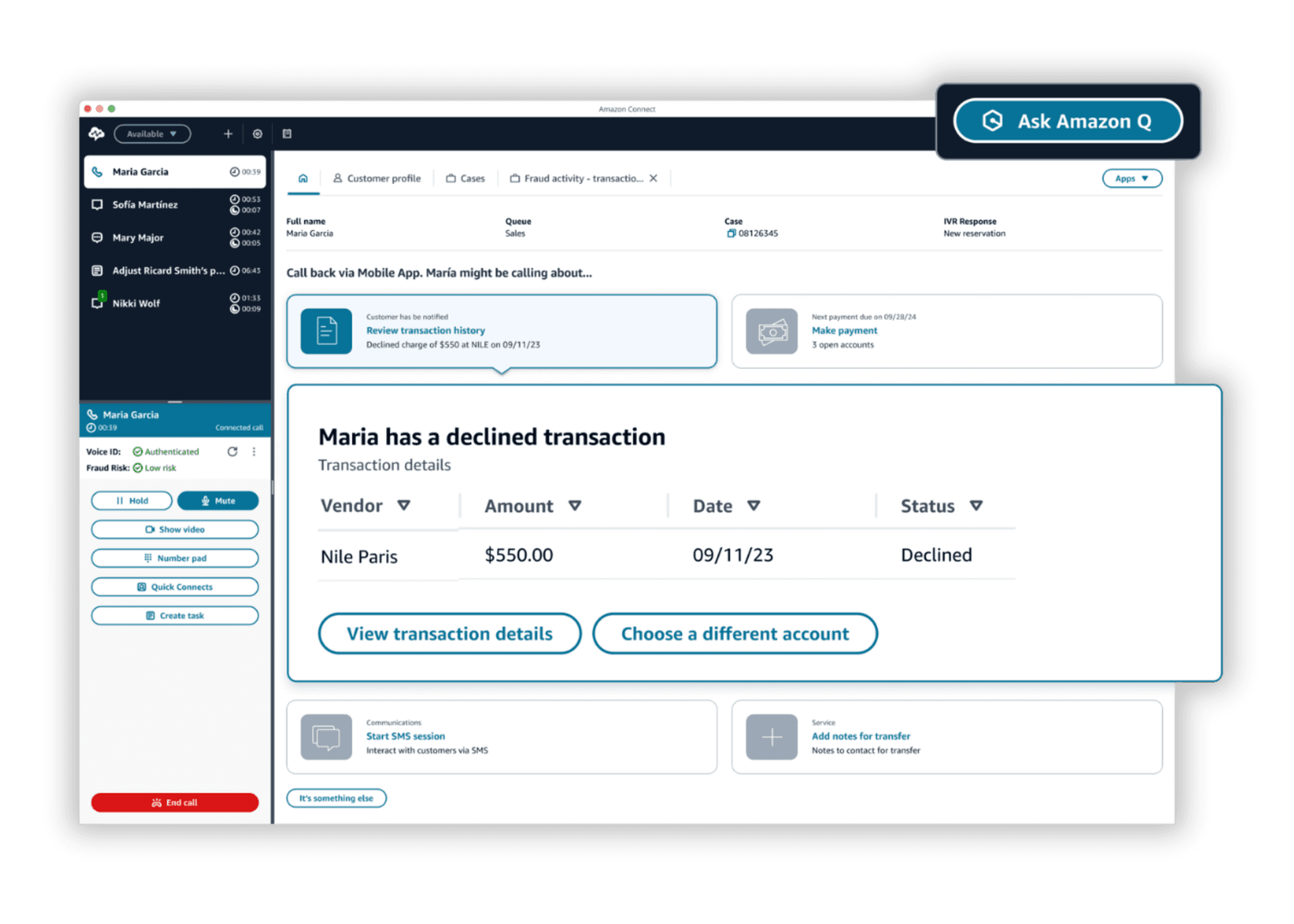
5. Amazon Connect
Amazon Connect is a cloud solution for contact centers, leveraging AWS infrastructure to provide a highly scalable, pay-as-you-use contact center solution with strong integration into the broader AWS ecosystem.
Key Features:
Pay-per-use pricing model
AI features and AI-driven automation enabled by AWS AI services, including machine learning, chatbots, and voice analytics
Highly customizable with AWS development tools
Global scalability and reliability
Contact Lens for conversation analytics
Best for: Technology-forward companies with development resources who want to build custom contact center solutions without vendor lock-in.
Strengths:
Cost structure: Pay only for what you use, no long-term commitments
Customization: Build exactly what you need using AWS services
Scalability: Handle sudden spikes in volume without planning ahead
Challenges:
Requires technical expertise to implement and maintain
Limited out-of-the-box agent coaching tools
Can become complex to manage without dedicated IT resources
This is perfect if you have a technical team and want the flexibility to build a custom solution that grows with your business.
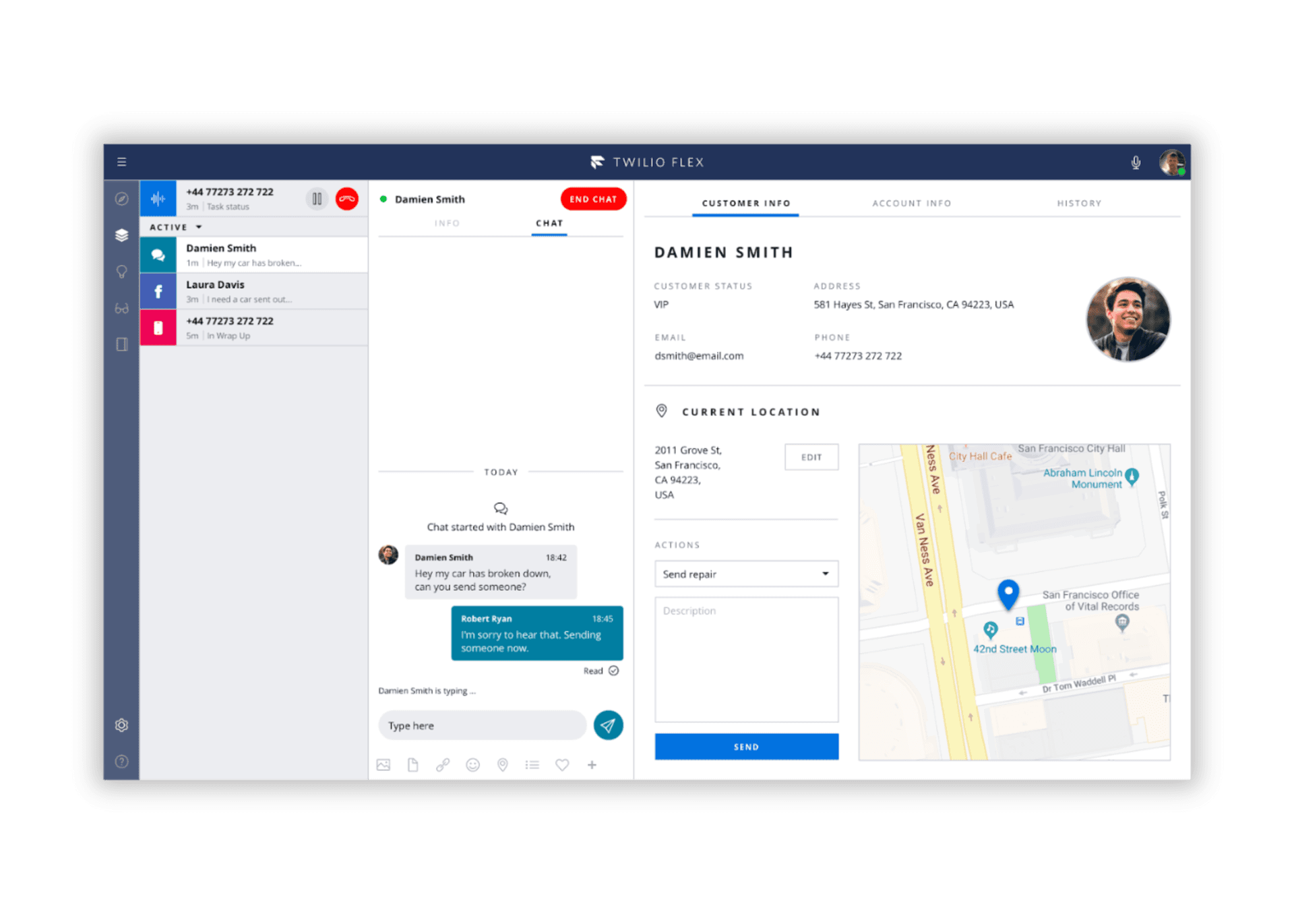
6. Twilio Flex
Twilio Flex is a programmable contact center platform that allows businesses to build customized customer service experiences using Twilio’s communication APIs. Its extensive feature set enables organizations to create tailored solutions that support a wide range of use cases and integration needs.
Key Features:
Fully programmable and customizable interface
Built on Twilio’s communication infrastructure
Supports multiple communication channels, including voice, SMS, email, chat, WhatsApp, and social media, for seamless omnichannel customer engagement
Plugin architecture for easy customization
Real-time insights and analytics APIs
Global reach with local phone numbers
Best for: Companies with strong development capabilities that need a completely customized contact center experience.
Strengths:
Ultimate flexibility: Build exactly the experience you want
Developer-friendly: Extensive APIs and documentation
Global infrastructure: Reliable service worldwide
Challenges:
Requires significant development investment
No out-of-the-box agent performance tools
Ongoing maintenance and customization needs
This is perfect if you’re a tech company that wants to build customer service directly into your product experience.
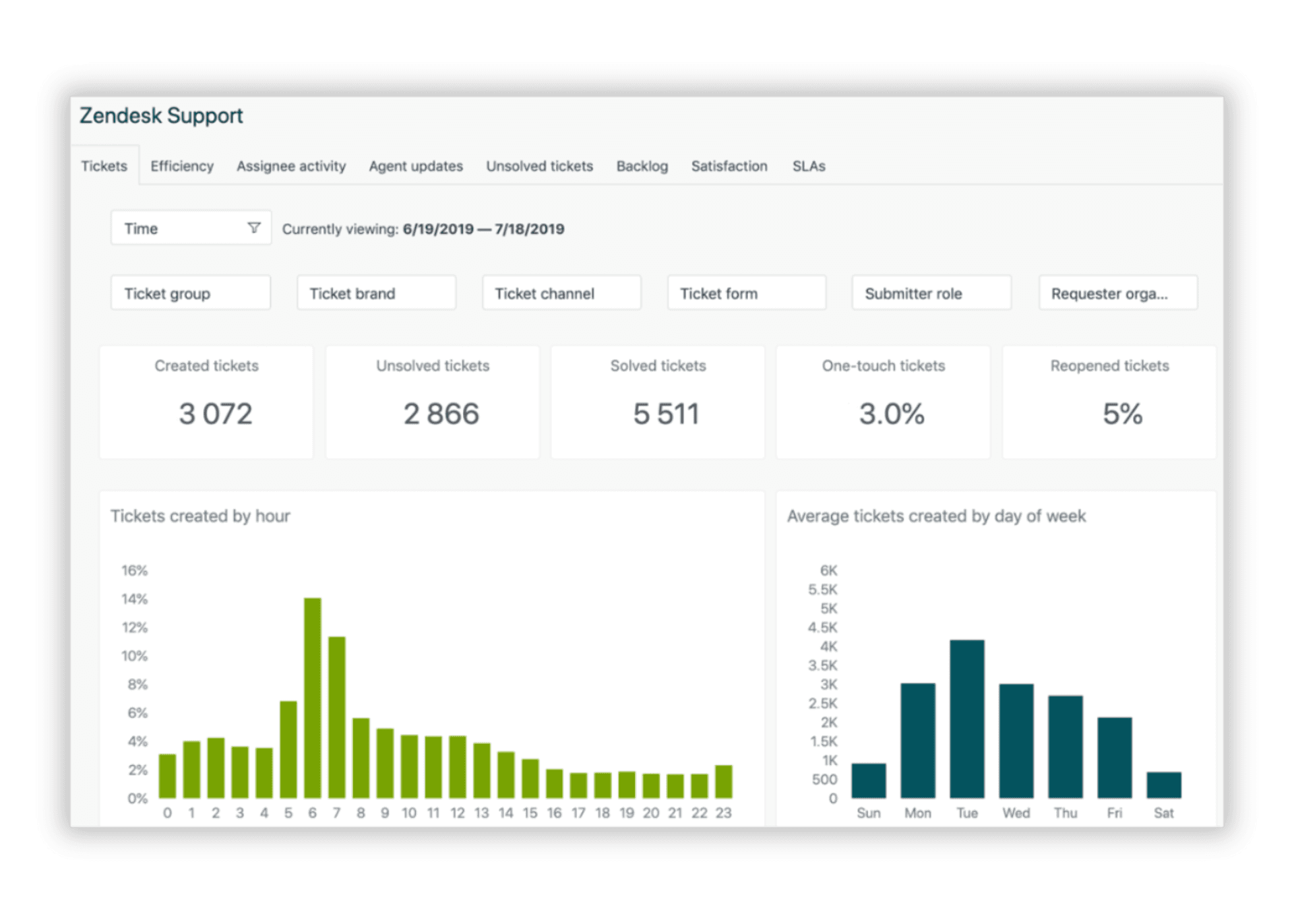
7. Zendesk Talk
Zendesk Talk integrates voice capabilities directly into the Zendesk customer service platform, providing a unified view of customer interactions across all channels.
Key Features:
Native integration with Zendesk Support tickets
Click-to-call from support tickets
Call recording, advanced recording features, and AI voicemail transcription
Basic routing and IVR capabilities
Unified reporting across all customer touchpoints
Best for: Small to medium support teams already using Zendesk who want to add voice capabilities without switching platforms.
Strengths:
Seamless integration: Works perfectly with existing Zendesk workflows
Unified customer view: See all interactions in one place
Simple setup: Easy to add to existing Zendesk implementation
Challenges:
Limited advanced contact center features
Basic reporting compared to specialized platforms
Not suitable for high-volume call centers
This is perfect if you’re already invested in Zendesk and want to add voice without disrupting your current workflows.
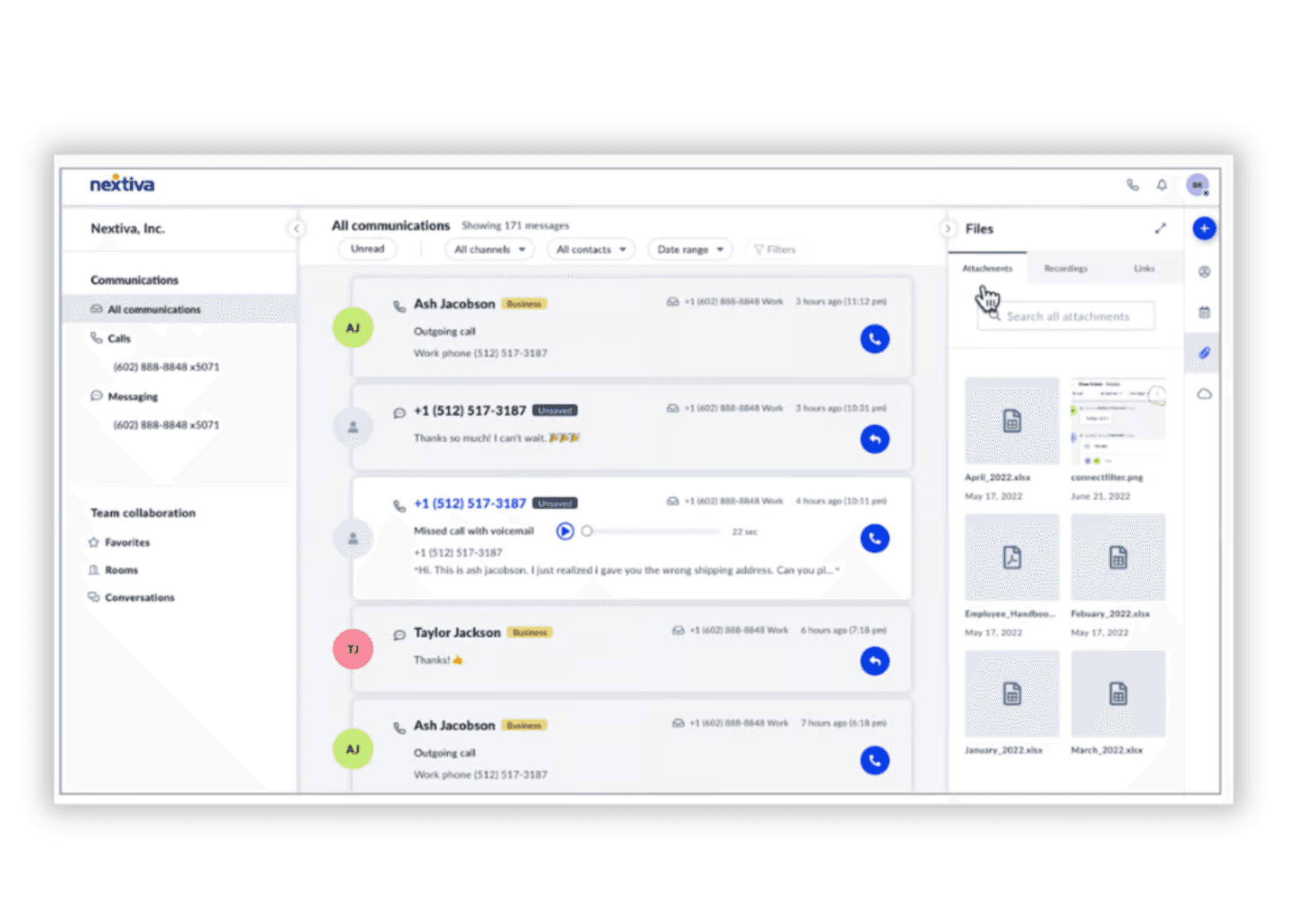
8. Nextiva
Nextiva combines business VoIP with contact center capabilities, focusing on providing excellent customer support for small and medium businesses. As a complete solution for business communication and customer support, Nextiva offers an all-in-one platform that streamlines multichannel interaction and enhances operational efficiency.
Key Features:
VoIP and contact center in one platform
CRM integration andcustomer journey tracking
Team collaboration tools
Call analytics and reporting
Award-winning customer support
Best for: Small businesses (10-50 agents) who want reliable voice communication with basic contact center features and excellent vendor support.
Strengths:
Excellent support: Known for outstanding customer service
Simple pricing: Transparent, all-inclusive pricing model
Reliability: Strong uptime and call quality
Challenges:
Limited advanced analytics and AI capabilities
Not suitable for complex routing requirements
Fewer integration options than enterprise platforms
This is perfect if you’re running a smaller support team and value simplicity and vendor support over advanced features.
9. 8x8
8x8 provides an integrated cloud solution for communications and contact center needs, with a focus on delivering consistent experiences across all channels.
Key Features:
Unified communications and contact center platform
Global cloud infrastructure
Omnichannel support including digital channels (voice, chat, social media, SMS, and more)
Advanced analytics and quality management
Workforce optimization tools
Open development platform
Best for: Mid-market companies (50-300 agents) who need reliable global communications with moderate contact center capabilities.
Strengths:
Global reach: Strong international presence and local numbers
Unified platform: Single solution for voice, video, chat, and contact center
Analytics: Good reporting and analytics capabilities
Challenges:
User interface can feel dated compared to newer platforms
Limited AI and automation features
Agent coaching tools are basic
This is perfect if you’re supporting customers globally and need a reliable, traditional contact center experience.
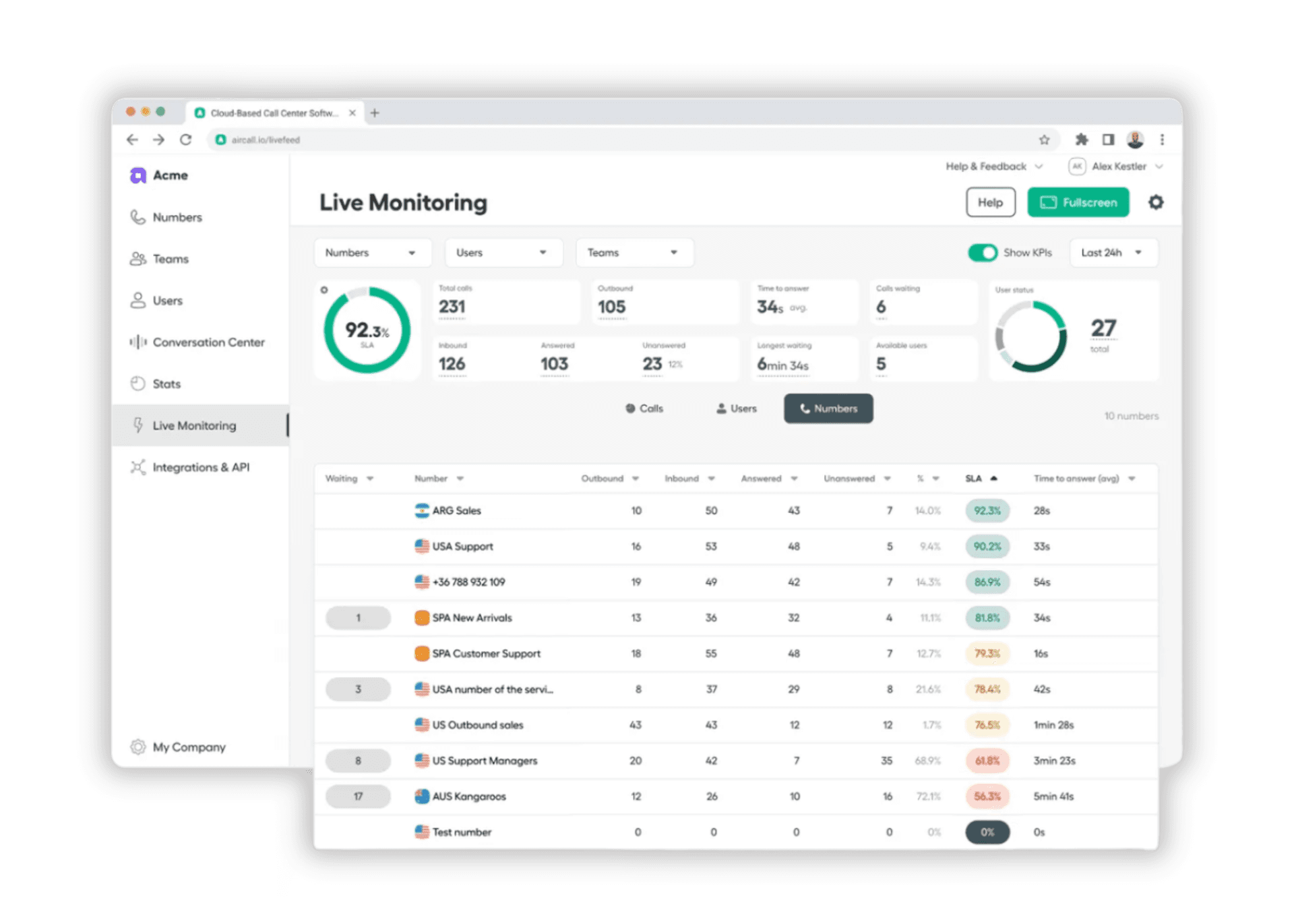
10. Aircall
Aircall focuses on providing a modern, easy-to-use phone system specifically designed for customer support and sales teams who value simplicity and integration.
Key Features:
Modern, intuitive interface
Deep CRM integrations (HubSpot, Salesforce, Zendesk)
Call routing and IVR capabilities
Real-time analytics and insights
Mobile and desktop apps
High-quality phone calls with integrated recording features for compliance and training
Best for: Growing support teams (10-100 agents) who want a modern, easy-to-use phone system with strong CRM integration.
Strengths:
User experience: Beautiful, intuitive interface that agents love
Quick setup: Get up and running in minutes, not months
CRM integration: Seamless data flow with existing tools
Challenges:
Limited advanced contact center features
No advanced AI or coaching capabilities
May not scale for very large operations







